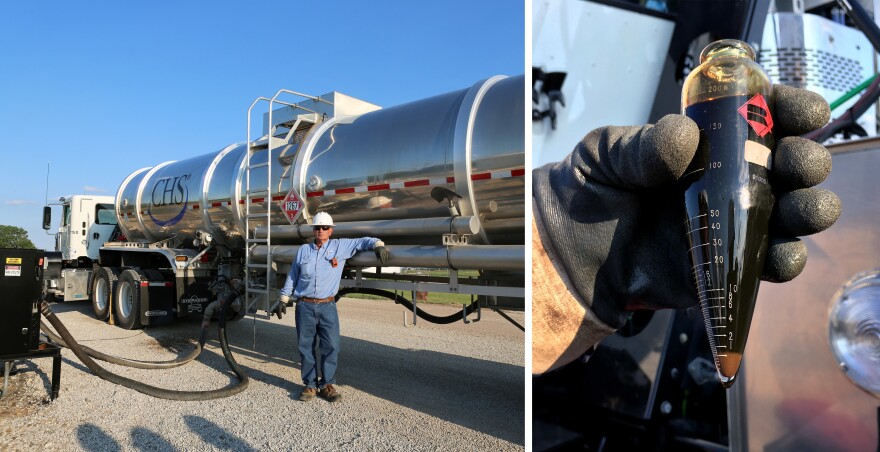The team at Planet Money set out to buy 100 barrels of crude oil right from the source, and then follow it from ground to gas tank.
After a little cajoling, Jason Bruns, a part-time preacher, part-time oil man in southern Kansas, agreed to pump us some oil from one of his wells in a cow pasture.

When do you get to actually touch crude oil? Never. It's silky, like shampoo. Don't try this at home kids.

The oil business is a handshake business, especially for small producers like Jason. Most of them operate on monthly contracts, often not knowing how much they get paid until the month is up because oil prices fluctuate so much. The money from this well gets split between Jason, who operates it, and the owners of the mineral rights.

Next stop, trucking it and selling it. Scott Zimmerman from the CHS refinery showed up to haul it. He told us when he started out, he'd wear more oil than he hauled. The secret to staying clean? Rags! Lots of rags.
Scott tested our oil using a centrifuge built into his truck.

We passed the test. Our oil was fine. Not great. Just fine. But good enough to get into the pipeline to the refinery.
The crude was pumped and slurped forward in this pipeline at about the speed you can walk.
At the refinery in McPherson, Kan., our crude got mixed up with all the other oil at the refinery, snaking through miles and miles of pipes and tanks. Refining crude oil is essentially a sorting process. Each step squeezes out a bit more fuel — some diesel, some gasoline, some butane and more — until there's a messy sludge left at the end used for asphalt.

After the refinery, it's another pipeline, and hundreds of miles to get to a gas station. Pipelines snake underground in much of middle America. You have to have keen eyes to spot the markers if you want to follow one.

The oil traveled on and on until it ended up as gas for your tank at Cenex gas stations. We filled up at the one in Council Bluffs, Iowa.

You can hear the full journey, including our clumsy attempt to sell our oil at a profit, in the podcast series here.
Copyright 2021 NPR. To see more, visit https://www.npr.org.


